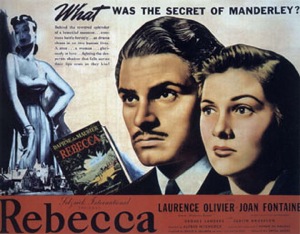
The shadow of a remembered woman came between their lips… but these two had the courage to hope… and to live their love!
The script Alfred Hitchcock concocted in 1939 for his America début in Rebecca wasn’t a tasteful reflection of the novel Daphne du Maurier had written, nor was it a faithful adaptation his producer and nemesis, David O. Selznick, had envisioned. Hitch added a mad grandmother, seasickness, his own brand of humor (the book is rather humorless) and a name—“Daphne”—for the nameless heroine. In one of the long memos for which Selznick was infamous, the head of that studio wrote that he was “shocked and disappointed beyond words,” that his film would be a scene-by-scene transfer, “ . . . not a distorted and vulgarized version of a [proven] successful work.”
In one of the long memos for which Selznick was infamous, the head of that studio wrote that he was “shocked and disappointed beyond words,” that his film would be a scene-by-scene transfer, “ . . . not a distorted and vulgarized version of a [proven] successful work.”
Another newcomer to Hollywood, Orson Welles, a year later, had carte blanche in making his first film, which turned out to be Citizen Kane. Hitchcock was not so lucky, despite the fuss made over his arrival in America. Although he had at his disposal sophisticated production values far superior to those in England, the freedoms he had previously enjoyed, including general authority over everything related to his films, were clearly denied him in Rebecca, and certainly in those future Hitchcock films produced under the hands-on perfectionist and full time egotist Selznick.
Du Maurier’s Rebecca, has the four essentials of the gothic novel, which grew out of the late eighteenth century and is typified in Charlotte Brontë’s 1847 Jane Eyre: (1) an innocent heroine, (2) an introverted and tragic hero, (3) a dark mansion and (4) a mysterious “other” woman. In Jane Eyre, the “other” woman is a mad wife, incarcerated in an inaccessible tower. There is no tower, or living first wife in Rebecca, only her implied presence in each room, made to seem alive by the fanatical devotion of housekeeper Mrs. Danvers. Assuming her husband, Maxim de Winter, is still in love with his previous wife, the dead Rebecca, the nameless heroine arrives at the Manderley estate and there discovers that Rebecca was a despicable person whom Maxim despises. As in Jane Eyre, there is a fire, and Manderley and Mrs. Danvers are destroyed; the couple presumably live happily ever after.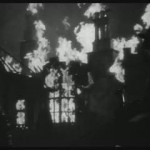
The director always disavowed that Rebecca was a typical Hitchcock film, and correctly so. Although there are striking visual images, for the director preferred to tell his stories with the camera, the film is uncharacteristically dialogue-heavy. Many scenes seem to run on without restraint: in the library where Maxim is showing his new bride their honeymoon pictures, though there is plot development, dark lighting and tension; the sequences related to the masked ball, with its tragic revelation that the costume Mrs. Danvers suggests to the bride actually recreates a dress worn by Rebecca, causing Maxim much anguish and a suicide suggestion from the housekeeper; Maxim’s confession in the beach house about his dead wife’s true character and how she died; in the bar when Jack Favell (George Sanders) presents Rebecca’s rendezvous note to him, suggesting she couldn’t have contemplated suicide; and the doctor’s contrary evidence that Rebecca was terminally ill.
Thanks to those Hollywood production values, Rebecca had all the visual qualities attributed to the finest of Hitch’s movies, more so than any of his previous films. George Barnes’ black and white photography is stunning, the camera movement fluid, moving toward doors and through passageways, from darkness into light, from light into darkness. The camera alone seems to chronicle the heroine’s progress, from the hesitant, mousey young second wife to the independent mistress of Manderley who later takes charge, initially against the domineering housekeeper. The metamorphosis is almost too sudden, and implausible.
 Art director Lyle Wheeler, who had received an Oscar for his work on Gone with the Wind and would be nominated for Rebecca, worked Manderley into a dreamlike reality, with exterior models and interior mattes. Some of the rear screen projection, very popular and accepted at the time, is crudely obvious to contemporary sophisticates.
Art director Lyle Wheeler, who had received an Oscar for his work on Gone with the Wind and would be nominated for Rebecca, worked Manderley into a dreamlike reality, with exterior models and interior mattes. Some of the rear screen projection, very popular and accepted at the time, is crudely obvious to contemporary sophisticates.
And, clearly, Rebecca has the best score of any Hitchcock enterprise to date. Many of his British films are weak on quality music, The 39 Steps, even, having very little. Franz Waxman, a German émigré who had escaped Hitler, composed, in 1936, a milestone score for The Bride of Frankenstein. For Rebecca he wrote alternately nostalgic and creepy music, always atmospheric to the screen, sometimes so dark and brooding that bits from earlier Max Steiner scores were inserted to brighten and enliven the Teutonic gloom. A few quick cuts…
From the start, however, the film had its problems, not unlike any number of Hitchcock films. There was always Selznick’s mettlesome interferences; in subsequent pictures, when he appeared on the set, Hitch would suddenly find something wrong with the camera, which would be “fixed” only after Selznick had left. Selznick, far from a stupid man, would get the message.
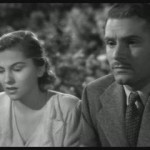 The selection of the two major stars was circumspect and made much ado about, typical of Selznick in preparing a movie. Under the pressure of the imminent start of shooting, Joan Fontaine as the second Mrs. De Winter was an almost reluctant choice, justified later when her inability to handle some of the more tense emotions was covered by judicious editing and dubbing. Laurence Olivier, fresh from his first Hollywood movie, Wuthering Heights, was accorded the role of Maxim de Winter, master of Manderley. Olivier had wanted his paramour, Vivien Leigh, to play his wife, and he took his disappointment out on Fontaine.
The selection of the two major stars was circumspect and made much ado about, typical of Selznick in preparing a movie. Under the pressure of the imminent start of shooting, Joan Fontaine as the second Mrs. De Winter was an almost reluctant choice, justified later when her inability to handle some of the more tense emotions was covered by judicious editing and dubbing. Laurence Olivier, fresh from his first Hollywood movie, Wuthering Heights, was accorded the role of Maxim de Winter, master of Manderley. Olivier had wanted his paramour, Vivien Leigh, to play his wife, and he took his disappointment out on Fontaine.
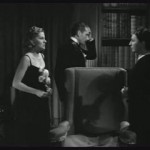 Olivier is rather stiff and stagy. As Donald Spoto writes in his new book about Hitch’s leading ladies, Spellbound by Beauty, “ . . . in the finished film, he can be seen rubbing his temples, passing his hand over his forehead and sighing deeply, as if confusing emotional anguish with a sinus headache. ‘His pauses are the most ungodly slow and deliberate reactions I have ever seen,’ Selznick noted—‘as though he were deciding whether or not to run for president, instead of whether or not to give a ball.’ ”
Olivier is rather stiff and stagy. As Donald Spoto writes in his new book about Hitch’s leading ladies, Spellbound by Beauty, “ . . . in the finished film, he can be seen rubbing his temples, passing his hand over his forehead and sighing deeply, as if confusing emotional anguish with a sinus headache. ‘His pauses are the most ungodly slow and deliberate reactions I have ever seen,’ Selznick noted—‘as though he were deciding whether or not to run for president, instead of whether or not to give a ball.’ ”
Hitch, like his all-British cast (except for Florence Bates as the vulgar American dowager), was worried about war conditions in England. His mother was still there and, besides, he was distressed that his players might return to their homeland.
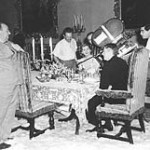 And then there was the crux of the novel, the ending: de Winter had, after all, murdered his wife, an act not allowed by the Hays Office, the guardian of morality in Hollywood at the time (obviously long gone). Accordingly, a new ending was achieved after much rewriting. Now Rebecca, in the argument with Maxim in the beach house, stumbles and hits her head on a heavy piece of ship’s tackle. Maxim sinks the body in a sail boat since he feels no one will believe it was an accident. To justify the sea cocks in the boat being open and to reinforce the idea of suicide, Rebecca is given inoperable cancer.
And then there was the crux of the novel, the ending: de Winter had, after all, murdered his wife, an act not allowed by the Hays Office, the guardian of morality in Hollywood at the time (obviously long gone). Accordingly, a new ending was achieved after much rewriting. Now Rebecca, in the argument with Maxim in the beach house, stumbles and hits her head on a heavy piece of ship’s tackle. Maxim sinks the body in a sail boat since he feels no one will believe it was an accident. To justify the sea cocks in the boat being open and to reinforce the idea of suicide, Rebecca is given inoperable cancer.
Selznick had his own problem with Hitchcock. His new director’s habit of shooting only what he needed for the final film, cutting in the camera, as it were, as John Ford also did, meant that there were few scraps—alternate camera angles or backup footage—which Selznick could edit into the film, thereby making it more his own. This drove Selznick up the wall.
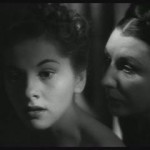 Judith Anderson, as the housekeeper Mrs. Danvers, gives, beyond doubt, the most memorable performance in the film, and she is almost lovingly photographed by Hitchcock. In her unchanging floor-length black dress, she seems to glide through the rooms; she is rarely seen entering but is just—suddenly—there. In her most dramatic scene, after a failed costume ball, Mrs. Danvers, hovering over the young heroine like a she-Dracula, suggests hypnotically that the wife end it all: “You’ve nothing to stay for. You’ve nothing to live for, really, have you? . . . Go on, go on. Don’t be afraid.” That is, to jump from the window into the sea. Waxman’s music, urging and taunting, supports Mrs. Danvers.
Judith Anderson, as the housekeeper Mrs. Danvers, gives, beyond doubt, the most memorable performance in the film, and she is almost lovingly photographed by Hitchcock. In her unchanging floor-length black dress, she seems to glide through the rooms; she is rarely seen entering but is just—suddenly—there. In her most dramatic scene, after a failed costume ball, Mrs. Danvers, hovering over the young heroine like a she-Dracula, suggests hypnotically that the wife end it all: “You’ve nothing to stay for. You’ve nothing to live for, really, have you? . . . Go on, go on. Don’t be afraid.” That is, to jump from the window into the sea. Waxman’s music, urging and taunting, supports Mrs. Danvers.
In an admitted excellent, if verbose script, each character seems to have at least one memorable line. Beatrice (Gladys Cooper), says to the heroine, “I can see by the way you dress you don’t care a hoot how you look.” But Beatrice isn’t necessarily cold: she puts her arm around the young bride as she leaves after their first meeting.
“I wish I had a young bride of three months waiting for me at home,” says the sly, greasy Favell (George Sanders). “I’m just a lonely old bachelor. Fare thee well.” Having sneaked in and found the young mistress hiding behind a door, he exits the house by stepping over the sill of a ground floor window.
When asked by the wife what Rebecca was really like, Frank Crawley, manager of the estate (Reginald Denny), says after a long pause, “I suppose . . . I suppose she was the most beautiful creature I ever saw.” The music swells and the camera pulls back to a long shot.
Mrs. Van Hopper (Florence Bates) discovers that the nameless one is to marry Maxim de Winter and asks her, “Tell me, have you been doing anything you shouldn’t?”
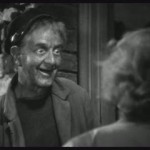 The young heroine first discovers the beach house—and the resident loony, Ben (Leonard Carey), who says, with a blank stare, “She’s gone in the sea, ain’t she? She’ll never came back no more.” He repeats these lines almost verbatim later when Rebecca’s sailboat is discovered.
The young heroine first discovers the beach house—and the resident loony, Ben (Leonard Carey), who says, with a blank stare, “She’s gone in the sea, ain’t she? She’ll never came back no more.” He repeats these lines almost verbatim later when Rebecca’s sailboat is discovered.
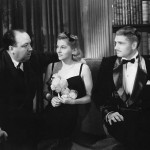 For 1940 Rebecca received eleven Oscar nominations—for picture (winning), director, actor, actress, supporting actress, screenplay adaptation, black and white cinematography (winning), black and white interior decoration, original score, film editing and special effects. That year Hitchcock was also nominated Best Director for Foreign Correspondent, a more Hitchcockian—and better—film than Rebecca. In the 1940s, Suspicion, Lifeboat and Spellbound would be nominated either for Best Picture or Best Director and, in the case of Spellbound, for both. The Hitch aura might have worn off, maybe because his films were getting darker, for, surprisingly, he would not be nominated for two far better films than any of those mentioned: Shadow of a Doubt in 1943 and Notorious in 1946.
For 1940 Rebecca received eleven Oscar nominations—for picture (winning), director, actor, actress, supporting actress, screenplay adaptation, black and white cinematography (winning), black and white interior decoration, original score, film editing and special effects. That year Hitchcock was also nominated Best Director for Foreign Correspondent, a more Hitchcockian—and better—film than Rebecca. In the 1940s, Suspicion, Lifeboat and Spellbound would be nominated either for Best Picture or Best Director and, in the case of Spellbound, for both. The Hitch aura might have worn off, maybe because his films were getting darker, for, surprisingly, he would not be nominated for two far better films than any of those mentioned: Shadow of a Doubt in 1943 and Notorious in 1946.